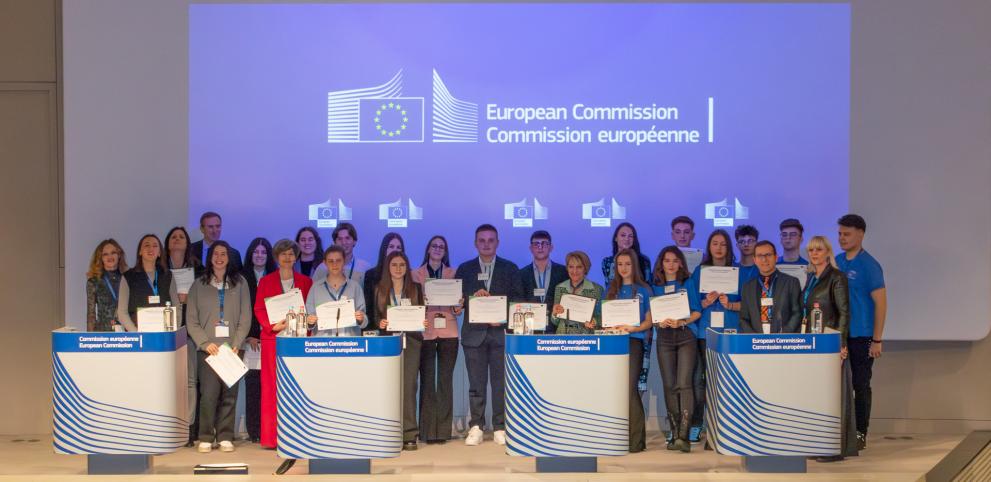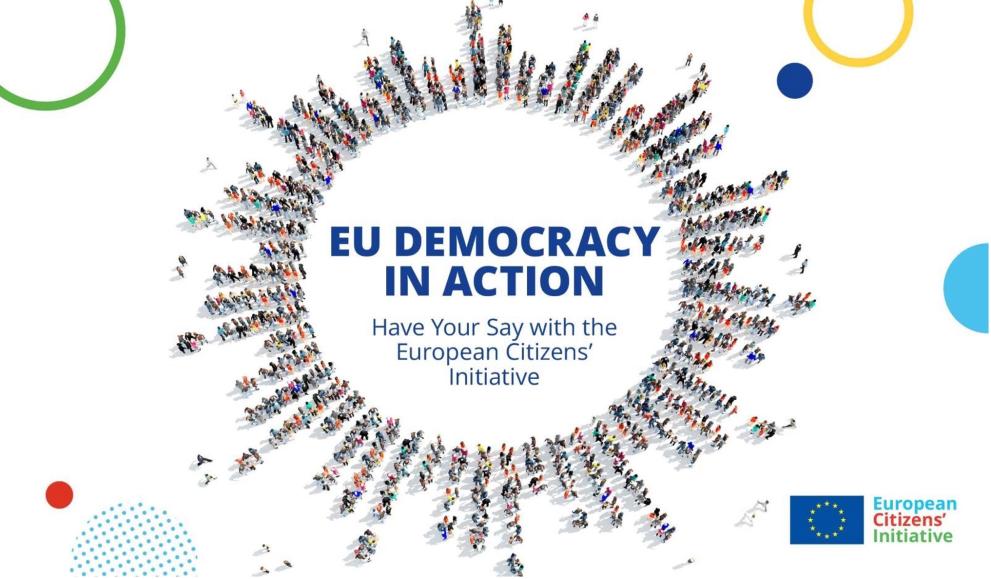The ImagineEU video competition called on young Europeans to practice what participatory democracy means. Teenagers in their last two years of secondary education, from all around the EU, were invited to think of concrete ideas that could benefit citizens across the Union, and which could be acted on at EU level, mirroring the concept of the European Citizens’ Initiative (ECI).
The competition gained a lot of interest from students and teachers from across the EU: in total, more than 400 videos were submitted, depicting the challenges that young people or their communities are facing nowadays. The three winning teams, who won a study trip to Brussels, came from Italy, France and Romania.
The competition
On 16 October 2023, the European Commission launched a video competition to raise awareness of the ECI among young Europeans and complement the release of the “EU Democracy in Action - Have your say with the European Citizens’ Initiative (ECI)” toolkit for schools.
The competition was addressed to students in their last two years of secondary education, from all over the EU. Under the motto ‘ImagineEU’, they created and submitted short videos in which they presented their ideas for change at European level. This was a unique opportunity for teenagers to showcase their ideas, which might someday become the focus of a European citizens’ initiative. The teachers were equally enthusiastic:
'This competition gave the young people of our school the opportunity to identify, analyse and find solutions to the problems of our community. It was an opportunity and an experience for which we thank you! Good luck in the future! Congratulations!'
'These kinds of competitions allow students to broaden their horizons as European citizens. This initiative, by making the students work on a different subject, improved their abilities, and expanded their skill set.'
'This initiative was very meaningful for my students as they could see that they could make proposals to the EU institutions. They realised that there were many aspects that could be changed in the EU to improve people's lives within EU competences.'
In groups of up to seven students from the same school, students presented their creative ideas in a short video, working under the supervision of one or two teachers. Over 400 videos were received, showcasing remarkable ideas for action, which included protecting the environment, integrating migrants, tackling the challenges of artificial intelligence, and adapting educational systems to the challenges of our world. The 388 videos that complied with the competition rules were published on the competition webpage, giving the public the opportunity to evaluate them for a month and a half.
Participants were invited to conduct their own promotional campaigns for their videos, encouraging friends and family to support and vote for their ideas. The public voting was seen as comparable to the signature collection period that a European citizens’ initiative must go through before it is eligible to be submitted to the Commission for a response.
Following this initial round of public voting, which determined the top 50 videos, a jury further evaluated the videos and finally selected the three winning teams. The jury consisted of representatives of the ECI community from EU institutions, national authorities, and civil society organisations, as well as young trainees from the European Commission.
The countries that submitted the most entries were Greece (74), Spain (70), and Portugal (56). Students were most interested in providing ideas on topics such as education, training and youth; the environment; and human rights and democracy.
The 3 winning teams
On 21 March 2024, the winners of the ‘ImagineEU’ competition were honoured during an award ceremony at the European Commission headquarters in Brussels. The three winning teams from France, Italy, and Romania, accompanied by their teachers, participated in a three-day study visit to the European institutions and beyond. Watch the winning videos below.
The Waste-filtering grids: a modest idea for a world free from pollution (Lycée Paul Langevin from La Seyne Sur Mer, France)
The video showcases the need to save water, primarily through hand-made animation.
The European Central Energy Bank - E.C.E.B. (Liceo Galileo Galilei, from Legnano, Italy)
The team proposed the creation of a European Central Energy Bank (E.C.E.B) to supply EU countries, in order to diversify energy sources, ensure a constant flow of energy, and reduce the impact of crises.
The rEUniON debate club platform (Liceul Teoretic International de Informatica Bucuresti, Romania)
The video presents ‘rEUniON’ - a structured environment for informed discussions about the EU, fostering a deeper understanding of its policies, challenges, and impact – with the aim of introducing rEUniON debate clubs in high schools across the EU.
The three winning teams during the award ceremony in Brussels
During the trip, the teams had the chance to learn more about the functioning of the EU and the role of the different EU institutions. In addition to the Commission, they visited the European Parliament and Parliamentarium, and the House of European History. The trip also offered cultural experiences including taking a chocolate workshop and exploring Brussels under typical Belgian weather. The teams took the time to gather and share their personal experiences, discussing their perspectives on Europe and brainstorming ideas on how they could get more involved.
What is the “EU Democracy in Action” Toolkit for Schools?
The ECI toolkit for schools is an interactive toolkit designed to equip high school students with the knowledge and skills that will allow them to become active and engaged EU citizens. Over four modules, each with a different focus, learners are moving from general information about the EU to more specific information and activities related to ECI. The course consists of a student’s workbook for use in the lesson and for homework; a teacher’s guide with lesson plans, answer keys, and further information; factsheets; video material and PowerPoint presentations; and an exit test. The toolkit is available in all official EU languages.
‘I have asked my students their opinion on the materials and I have to say they have liked them very much. They didn't know a lot about the European Citizen's Initiative, and they found the materials interesting. They enjoyed the approach chosen to present everything and work on the information, and they especially liked the videos, they found them short and clear, which they appreciated.’
- Secondary school teacher from Spain who piloted the toolkit
Can you think of a concrete idea to make the EU an even better place to live?
What your idea would be? In which EC area of competence are you interested in?
Additional Information:
Discover the initiatives that are collecting signatures now!
The European Citizens’ initiative Step by step
The European Citizens’ Initiative: Your right as an EU Citizen
The recording of the webinar introducing the toolkit
The European Citizens’ Initiative in key figures
Engage with the European Citizens' Initiative Ambassadors
Contributors
Konstantina MintzoliKonstantina is a Senior Communication Strategist (EU affairs) working on the European Citizens’ Initiative communication campaign (2022-2024). Konstantina has a master’s in international migration and a master’s in political strategy and communication. Since 2016, she has held various communication-related roles in UN and EU agencies.
- Categories
- Events and awareness raising




Leave a comment
To be able to add comments, you need to authenticate or register.